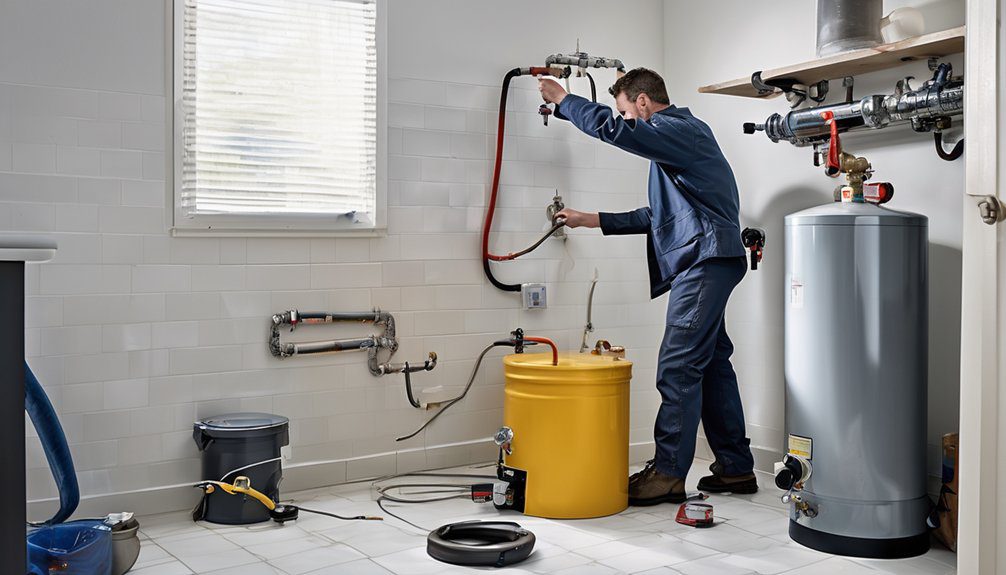Water heater replacement costs depend on the type, size, and installation complexity. Electric models cost $300 to $700, while gas units range from $500 to $1,200. Tankless and heat pump heaters can cost $1,000 to $2,800. Installation fees vary with plumbing or electrical work and may include permits or upgrades. Your choice should match your household size and energy preferences. Understanding these details helps you plan your budget; further insights will clarify your options.
Factors Affecting Water Heater Replacement Costs
Several factors influence the cost of replacing a water heater, and understanding these can help you plan your budget more effectively.
First, the unit’s size and capacity affect the price; larger tanks generally cost more.
Installation complexity also plays a role, especially if your current setup requires adjustments to plumbing or electrical systems.
Location matters too, since labor rates vary by region.
Additionally, the age and condition of your existing infrastructure can impact costs if repairs or upgrades are needed.
Finally, choosing energy-efficient models may have higher upfront costs but can save you money long-term through reduced utility bills.
Average Price Range for Different Types of Water Heaters
When considering water heater replacement, understanding the typical price ranges for different types of units can help you make an informed decision.
Electric water heaters usually cost between $300 and $700, offering a straightforward option.
Gas models tend to range from $500 to $1,200, reflecting their efficiency and fuel source.
Tankless water heaters, which provide endless hot water, often fall between $1,000 and $2,500.
Heat pump water heaters, known for energy savings, generally cost $1,200 to $2,800.
These ranges give you a clear starting point to evaluate which type fits your budget and needs without surprises.
Installation Considerations and Additional Expenses
Choosing the right water heater is only part of the overall expense. Installation involves several factors impacting your total cost.
You’ll want to take into account the complexity of plumbing and electrical work, which can vary widely. Additional expenses may arise from permits or code compliance requirements.
Also, the location of the new unit might require modifications to your home’s structure or ventilation.
Keep in mind these key installation considerations:
- Upgrading electrical or gas lines
- Necessary permits and inspections
- Structural adjustments for unit placement
- Ventilation or exhaust system updates
These aspects affect your freedom to install without surprises.
Choosing the Right Water Heater for Your Home
Although selecting a water heater might seem straightforward, understanding your home’s specific needs is essential to make an informed decision.
You should consider the size of your household, daily hot water usage, and energy sources available. Tankless models offer on-demand heating and energy savings, while traditional tank heaters provide consistent supply but use more space.
Evaluating fuel types—electric, gas, or solar—helps match efficiency with your budget and environmental preferences. Additionally, check local codes and installation requirements to avoid surprises.
Frequently Asked Questions
How Long Does a Typical Water Heater Replacement Take?
You’ll usually finish replacing a water heater within 2-4 hours. If you’re prepared and everything’s straightforward, you’ll enjoy freedom from cold showers fast, letting you get back to your day without hassle or delay.
Can I Finance My Water Heater Replacement?
Yes, you can finance your water heater replacement! Many companies offer flexible payment plans or financing options, so you can upgrade without upfront stress. Just check terms and choose what fits your budget and freedom best.
What Maintenance Extends Water Heater Lifespan?
You can extend your water heater’s lifespan by flushing the tank annually, checking the anode rod every couple of years, insulating pipes, and lowering the thermostat. These simple steps keep it running efficiently and free you from early replacements.
Are There Rebates for Energy-Efficient Water Heaters?
Yes, you can find rebates for energy-efficient water heaters through local utility programs or government incentives. Check your state’s energy office or utility provider’s website to grab savings and enjoy lower bills while reducing your environmental impact.
How Do I Dispose of My Old Water Heater?
You can recycle your old water heater by contacting local scrap yards or recycling centers. Don’t forget to check for municipal disposal programs or schedule a pickup with your installer—they often handle removal, saving you hassle.
